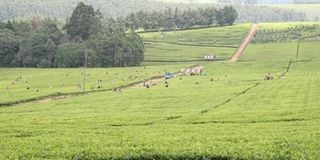Private firms just the cup of tea South Rift farmers need

Workers pluck tea at a Tea Estate in Nandi Hills, Nandi County in the past. PHOTO | JARED NYATAYA |
What you need to know:
- Investors are looking for factories that offer direct involvement in tea processing and marketing.
The entry of more tea processing factories in the South Rift is expected to increase competition for produce, with farmers hoping this will improve their fortunes.
Investors are looking for factories that offer direct involvement in tea processing and marketing. The sector is largely dominated by the Kenya Tea Development Agency and multi-nationals.
The move has been further fuelled by the government’s decision to eliminate restrictive regulations by supporting reforms that allow private industries to compete favourably with the public sector.
Some of the companies joining the sector include Kisyet, Chesumot, Kuresoi and Sot-Teg.
The Kericho County government is mulling the setting up of a tea firm in Kabianga while a group of large-scale growers in Konoin, Bomet County, also plans to construct a tea plant.
Tea prices have remained low and unpredictable for the past seven years due to a glut in the international market and poor uptake by traditional foreign-based buyers. Expenses like warehousing, cess reductions and levies have also been high. As some farmers uproot the crop out of desperation, proponents of the fnew factories say the solution lies in reducing production costs, minimising beneficiaries (managers), and value addition.
The new Kisyet factory in Bomet County will deal in blended tea. The firm, owned by former Cabinet minister Franklin Bett is being built at a cost of Sh150 million.
A few kilometres away is farmer-owned Sot-Teg Co-operative. Machinery has already been installed and the firm should be running soon.
Kuresoi factory in Kericho County, owned by private partners, is set to open this month.
Mr Kim Martins, a large-scale farmer in Kericho, is setting up a Sh50 million plant at his Chesumot farm that can process up to 15,000 kg of tea leaves a day.
Older private firms already fighting to attract more produce from growers in the region include Kaisugu, Mau Tea, Kapchebet and Kabianga Tea factories.





